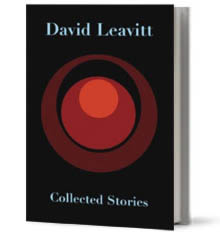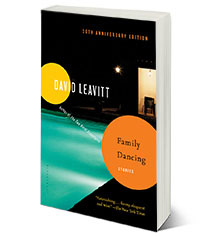STORIES
Collected Stories
BLOOMSBURY, 2003 (COMPRISING THE MARBLE QUILT, A PLACE I’VE NEVER BEEN, AND FAMILY DANCING.)
This edition gathers together the stories from Family Dancing, A Place I’ve Never Been, and The Marble Quilt, which has never before appeared in paperback.
Collected Stories is published by Bloomsbury. The collection also appeared in the UK, also from Bloomsbury, as The Stories of David Leavitt.
BUY Amazon barnes & noble indiebound
ON Collected Stories
“Leavitt is a master stylist, if that means his prose is efficient and capacious. All too many skilled essayists seem to lose 10 IQ points when they turn to fiction, but Leavitt's stories are at least as interesting as superb non-fiction; he makes us recall that Proust began his mammoth novel as a Platonic dialogue between his mother and the narrator. In ‘The Infection Scene,’ one thread of the long short story is an essayistic look at the unpleasant life of Lord Alfred Douglas, which the author introduces with a wholly imagined scene. I guess this procedure is sometimes called ‘creative non–fiction’ these days, but it is just one more example of the fruitful breakdown of genre distinctions—and of the extraordinary agility of this important writer. He is that rarest of all rare birds—a man of letters.”
—Edmund White, The Guardian
on family dancing (1984)
“In Family Dancing David Leavitt has fashioned from that oldest of themes—the complexities of family life, its satisfactions and its perils—an astonishing collection of short stories: tender, funny, eloquent and wise. That Mr. Leavitt is 23 years old only underscores his accomplishment—regardless of age, few writers so effortlessly achieve the sense of maturity and earned compassion evident in these stories.”
—Michiko Kakutani, The New York Times
“These stories, that is, those that are about boys, are very much of their historical moment—post-Stonewall and pre-AIDS. There are no guilty conferences with shrinks, as in the TV adaptation of Laura Hobson’s Consenting Adult, no anguished cries against fate, as in the TV movie An Early Frost. These upper-middle-class families have more need of Miss Manners’s advice on what sleeping arrangements to make for a son and his friend than they do of APA reports. The young men themselves feel some nostalgia for the closet as a form of adolescent privacy and coming out is remembered, if at all, as a somewhat awkward family council. ‘It’s OK, honey,’ which indicates the distance traveled since the furtive prairie fires of The City and the Pillar…The prodigal, in Leavitt’s work, is restored to the family bosom because no one is in a position to throw too many stones. In a sense everything has already happened; the stories are about fallout, adjustments, losses, fear of the ‘unspoken being spoken.’ Leavitt fully exploits the convention of family gatherings as volatile occasions. Most of the stories are centered around returns, reunions, the ways by which the fleeting years are gauged.”
—Darryl Pinckney, The New York Review of Books
“The remarkable thing about David Leavitt’s stories is their consistent but unspectacular realism. This young writer shows promise of becoming one of the class of what Virginia Woolf called ‘the great truth-tellers.’ Every story in his collection is immediately gripping and completely believable. The reader seems to wake up in the middle of a family, and then experience its private circumstances with the clarity and terror of real life.”
—James R. Zimmerman, The Cleveland Plain Dealer
on A place I’ve never been (1990)
“In its preoccupation with the counterfactual, the hypothetical, unlived possibilities and unvisited places, Leavitt’s collection of stories implicitly finds guidance in the work of Henry James. The title proffers the book’s central metaphor of experience missed, and the unvisited places of Leavitt’s volume are recognizable topoi from the fiction of Henry James. Behind the stories in this collection hover Jamesian tales of lives not lived, vicarious doubles, regrets, returns, and specters of second chances. Yet if Leavitt’s stories echo James’s, it is James with a difference. In Leavitt’s version, the Jamesian bachelors are gay, the smudge of mortality is AIDS, the article manufactured at Woollett might be a condom. In other words, to cite Eve Sedgwick’s adaptation of James’s metaphor, the beast is out of the closet.”
—Julie Rivkin, The Henry James Review
“In addition to portraying youth's naiveté and confusion, along with its extraordinary openness to experience, Mr. Leavitt also evokes the disappointments and constricted horizons of middle age, the failures and fears of the elderly and the desperate rage of the terminally ill. And, finally and most importantly, Mr. Leavitt’s fiction deftly places the many varieties of love and sexual attraction in perspective, seeing them as part of the vast, complex mosaic of human experience and emotion.”
—Wendy Martin, The New York Times Book Review
“A few years ago, when David Leavitt's first collection of stories, Family Dancing, appeared, something inevitable occurred. Leavitt, who immediately emerged as a gifted new voice in the under-30 literary set, became labeled as a 'gay writer’ This reductive tag seemed unavoidable, given Leavitt's honesty and openness in addressing his own homosexuality. But as A Place I’ve Never Been demonstrates, such a classification undersells the author’s extraordinary ability to create fiction resonant with the larger world, the world in which we all uneasily confront our mysterious hopes, dreams and fears. Like the great observer of everyday life, John Cheever, Leavitt searches for truth in the still confines of suburbia—in unlit bedrooms where desperate lovers pull helplessly at each other, in backyard spats between isolated neighbors, in lonely veterinary offices—and in subtle emotional transactions among ordinary people.”
—Carlton Smith, The San Diego Union
on The Marble Quilt (2001)
“In The Marble Quilt, Leavitt offers nine tales that reveal the way passion can both imprison and haunt us. While Leavitt’s methods are as varied as his tone—one tale takes the shape of a police interrogation, another is composed entirely of e-mails—a somber, contemplative mood hangs throughout...[I]n the end, what The Marble Quilt owes to its predecessors—James and Forster come to mine—is not its content or style, but rather its unflinching exploration of the link between passion and danger, death and desire. Like the fatally doomed men who stalk through the novels of Thomas Mann and Gabriele D’Annunzio, Leavitt’s characters cannot help themselves from giving into their carnal urges, even when they know it spells their demise. It is a narrative as old as the body. Still, rendered here in Leavitt’s assured, if familiar tales, it acquires an oddly luminous glow.”
—John Freeman, The Sun-Sentinel
“The nine artfully crafted stories of The Marble Quilt are marked by David Leavitt’s characteristic intelligence and grace. Whether navigating the Jamesian terrain of Americans in fin-de-siècle Europe or the petty e-mail backbiting of 21st-century academics, Leavitt’s sensibilities are as sharply honed as ever. Even the shortest piece, at a scant four pages, resonates with a psychological depth that’s rare in most contemporary fiction of any length. The Marble Quilt is a smart, sly, seductive collection that reaffirms Leavitt’s status as one of the finest short story writers in America today…Whether set in Victorian London, turn-of-the-century Switzerland, or Hollywood in the 1960s, Leavitt’s stories invite us to explore the perversity, the fragility, and the mystery of human behavior. From story-telling's disarming duplicities, Leavitt reminds us, come the most startling and revelatory truths.”
—Karl Woelz, The Gay and Lesbian Review Worldwide
“In ‘Black Box,’ the companion of a man killed when a plane explodes near Newfoundland falls into bed with another apparent survivor. ‘All speculation about the cause of the crash—bomb, missile, pilot error’ will be allayed once the black box of the title is retrieved. The events of this month cast a pall on this story, one of several rich and ambitious essayistic narratives in David Leavitt’s new collection, The Marble Quilt...The stories hopscotch in both time and place. They create a textured fabric, part story, part social commentary on the nature of desire and death both today and in years past, his intelligence and deft prose together creating an elegant and provocative collection.”
—Sara Ivry, The Hartford Courant


Foreign Editions—Family Dancing
Apostrof (Denmark)
Otava (Finland)
Denoel (France)
Rowohlt (Germany)
Odysseas (Greece)
Zmora Bitan (Israel)
Mondadori (Italy)
Kawade Shobo (Japan)
De Harmonie (The Netherlands)
Cappelans (Norway)
Teorema (Portugal)
Lambda (Slovenia)
Anagrama (Spain and Latin America)
Columna (Spain, Catalan)
Albert Bonniers (Sweden)
Penguin (United Kingdom and India)
Awards & Honors—Family Dancing
Finalist for the National Book Critics’ Circle Award
Finalist for the PEN/Faulkner Prize
Finalist for the Premio Milano
Foreign Editions—A place i’ve never been
Svoboda (Czech Republic)
Flammarion (France)
Rowohlt (Germany)
Polis (Greece)
Mondadori (Italy)
De Harmonie (The Netherlands)
Bertrand (Portugal)
Anagrama (Spain and Latin America)
Albert Bonniers (Sweden)
Penguin (United Kingdom and Commonwealth)
Foreign Editions—the marble quilt
Mondadori (Italy)
De Harmonie (The Netherlands)
Teorema (Portugal)
Anagrama (Spain and Latin America)
Abacus (United Kingdom and Commonwealth)
